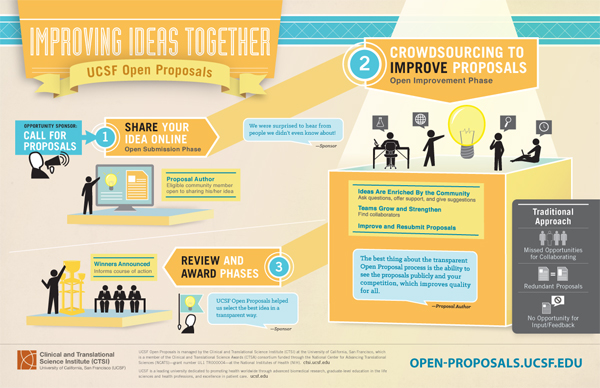
Crowdsourcing platform enables collaborative proposal development and team building
With an eye toward rethinking proposal development and team building, UCSF’s Clinical and Translational Science Institute (CTSI) created UCSF Open Proposals. The idea was simple: turn the traditional approach—missed opportunities for collaborating, redundant proposals, and no opportunity for feedback or proposal improvement—on its head. And as it turns out, that’s just what others at UCSF were looking for.
When Helen Loeser, MD, MSc from UCSF’s Academy of Medical Educators, and Gail Persily from the UCSF Library were collaborating with other campus partners, including the Center for Interprofessional Education, seeking to fund innovations to foster curricular and educational excellence, they knew they wanted to gather ideas in a different way.
Loeser and her colleagues had a few priorities, including encouraging a transparent, community-based approach to problem solving and idea incubation, and encouraging teams to work across silos and leverage the expertise of the UCSF community.
“The goals of the Open Proposals platform—innovation, transparency and collaboration— were clearly consistent with the goals of this new collaboration between our funding programs,” said Loeser. The result was “Innovations Funding for Education - A collaborative call for proposals to create innovative approaches to teaching and learning at UCSF.”
The UCSF Open Proposals platform provides an interactive, online space for users to contribute to and weigh in on various university initiatives.
See Full Infographic
Originally conceived in 2009 by CTSI Executive Director Mini Kahlon, PhD, as a way for the Institute to reach a campus-wide audience and gather the best ideas for its second NIH grant proposal, the effort has illuminated the limits of traditional academic and administrative proposal development. Other leaders at CTSI supported this approach, which also demonstrated the importance of early leader buy-in to support an open approach over the traditional RFP model.
Of the 53 ideas submitted to the CTSI call for ideas, the first using the UCSF Open Proposals platform, 11 were incorporated into the final grant proposal, which was subsequently awarded. Since then, UCSF Open Proposals has evolved to accommodate a variety of departments and campus entities that have used it to identify the best ideas and proposals, and gather feedback and support for their initiatives.
“There are numerous benefits of this open, bottom-up, crowdsourcing approach for proposal gathering and development,” said Kahlon. “Open, iterative feedback provides an opportunity to improve ideas, other submitters may form new teams together, and similar proposals can integrate or leverage existing programs and personnel.”
How the Magic Happens
UCSF Open Proposals partners with sponsors, or “hosts,” to present the community with a call for proposals, or “opportunity,” which can range from a pilot project funding award to a public brainstorming session that seeks input from a wide audience. After sponsors make a call for proposals, proposers submit ideas online during an “Open Submission Phase.”
The game-changing elements of opening up this ideation process, however, occur during phase two, the “Open Improvement Phase.” Ideas and proposals are enriched and improved in the following ways:
- Proposers can gauge interest, test the feasibility of an idea, and improve an original proposal based on feedback and input from the community,
- Redundant proposals can be withdrawn or combined,
- Teams can grow and strengthen as proposers seek collaborators, or commenters share expertise and/or interest in joining a team.It was great to receive feedback. I enjoyed giving others feedback and reading the range of interesting projects that were being submitted.Proposal Author, Innovations Funding for Education
After the commenting and improvement phase, proposals are reviewed and awardees selected. Reviewers are encouraged to submit feedback on all proposals during the Open Improvement Phase to enhance the learning experience for all participants.
In the case of the Innovations Funding for Education opportunity, organizers found the results to be overwhelmingly positive. Of the 64 proposals submitted, there were 332 comments, and 16 proposals were awarded. Ideas ranged from design-based research to the development of a musculoskeletal procedures curriculum.
“We were very pleased by the response; we hadn’t expected so many proposals,” said Persily, who had previous experience with the platform to solicit Coursera Course proposals for UCSF. “The platform itself functioned very well; it was easy to navigate and to extract data, making it very easy for program staff to access proposals as needed throughout the process.”
CTSI's Virtual Home (VH) team continues to maintain and develop the Open Proposals platform. Feedback and suggestions based on users’ experiences have informed improvements in the product’s design, supported use cases (workflows) and new features.
A growing number of faculty and staff across campus are experimenting with the UCSF Open Proposals platform, and other universities have taken notice and expressed interest in setting up their own transparent proposal development system.
CTSI plans to continue to improve the platform as well as build a model that can scale to other institutions - both Harvard University and UC Merced have adopted the Open Proposal platform for their own crowdsourcing initiatives.
Facts & FIgures
Since Launch in 2012 (as of April 2014)
-25 forums
-750+ proposals
-18,000+ visitors
-2100+ comments on proposals
-$4,000,000+ in funding awards
-Other University Adopters: Harvard, UC Merced
See Detailed Stats
Related Links:
- Crowdsourcing the CTSA Innovation Mission - CTSI article on UCSF Open Proposals published in Clinical and Translational Science, April 2014.
- Slide Presentation on UCSF Open Proposals, CTSA Toolshop & AMIA 2014
UCSF's CTSI is a member of the Clinical and Translational Science Awards network funded through the National Center for Advancing Translational Sciences (grant Number UL1 TR000004) at the National Institutes of Health. Under the banner of "Accelerating Research to Improve Health," CTSI provides a wide range of resources and services for researchers, and promotes online collaboration and networking tools such as UCSF Profiles.
